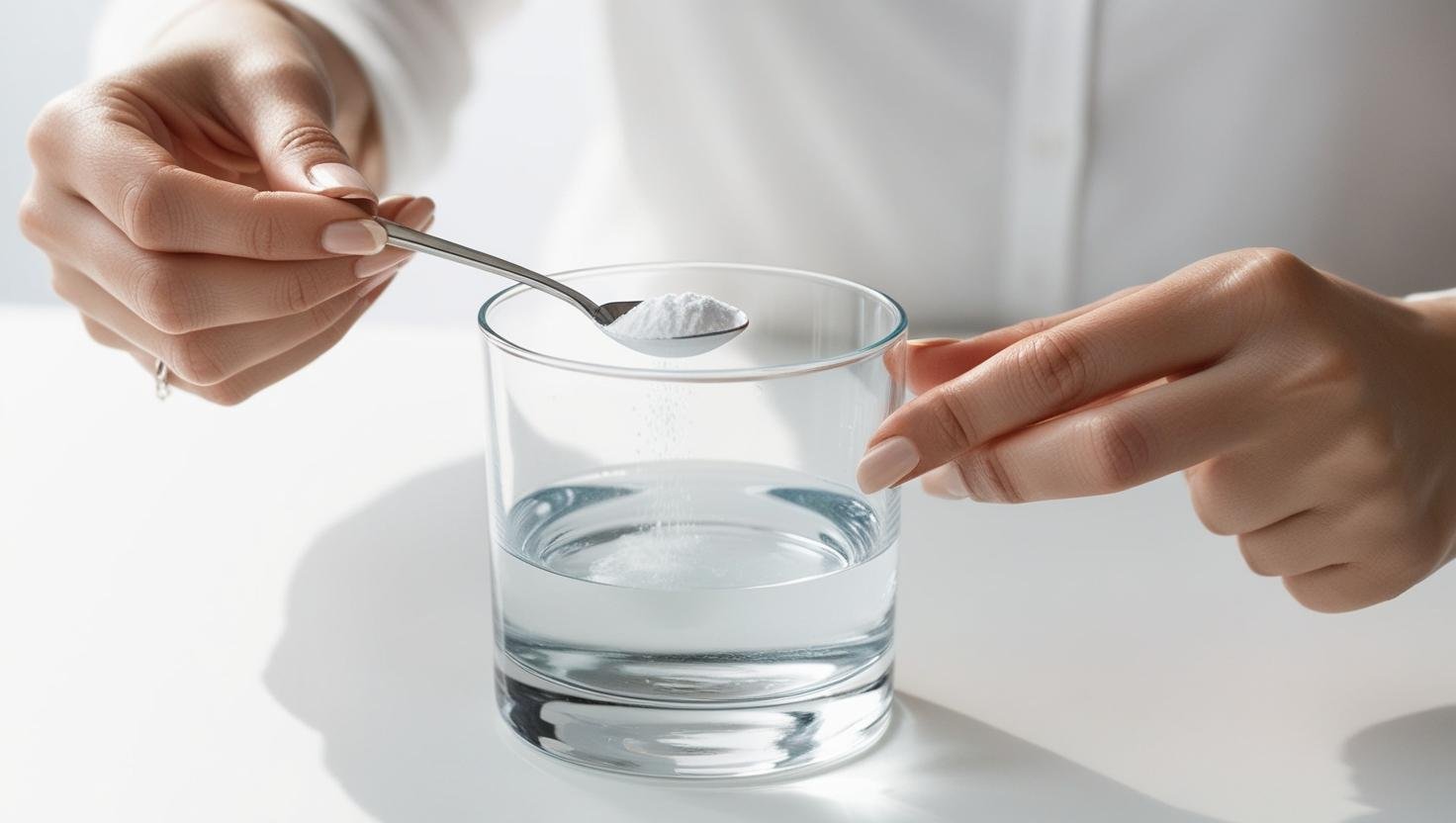Creatine for women is a safe and popular supplement that helps with energy, strength and muscle recovery. Many people think it is only for bodybuilders or men with big muscles, but the opposite is true. Creatine is also great for women – it boosts workout performance, reduces fatigue and may support brain health.
It is one of the most studied supplements in the world, with over 1,000 studies showing it is safe and offers many benefits for women. Some research shows it can also help with PMS symptoms like tiredness, mood changes and brain fog and more, which we will address later in the article. It may even help with memory, focus, and feeling better overall, especially for women who dont get much creatine from food.
In this article, you will learn what creatine is, how it works, its main benefits and side effects, and if it is right for you. We will also debunk some common myths about creatine that often confuse women. Ladies, its time to rethink creatine!
What is creatine?
Creatine comes from two main sources: about half is made naturally in your body and the other half comes from the food you eat. Your body produces creatine in the liver, kidneys and pancreas by combining three amino acids: arginine, glycine and methionine. Its main job is to give energy to your muscles during workouts. If you don’t have enough creatine, your muscles might feel weak or cramp.
If you don’t eat animal products, you may want to consider taking a creatine supplement. Vegetarians and vegans often have lower creatine levels because their diets lack major dietary sources of it. The best form to take is creatine monohydrate, which is the most researched and proven effective.
In which food is creatine:
- Meat (especially beef and pork)
- Fish (like erring, salmon and tuna)
- Poultry (chicken and turkey)
- Dairy (in smaller amounts)
Benefits of creatine for women
Dr. Stacy Sims is a big believer in creatine for women and says it’s one of the most important supplements many women still haven’t tried. So let’s look at some of the reasons why creatine can be helpful for women:
Improves strength and muscle performance
Women have less natural creatine in their bodies than men because of their diet, muscle size, and hormones. After age 30, women lose 3-8% of their muscle mass every 10 years, and this happens faster after age 50. When women go through menopause, they lose estrogen, which makes their muscles weaker and smaller. As muscles shrink, fat often takes their place. This can cause more health problems like diabetes and heart disease.
Taking creatine supplements might help by making muscles stronger and bigger, giving more energy, and helping muscles heal. This works for women at all ages, especially if they do strength training. Older people can also benefit from creatine to help keep their muscles.
Increases energy, endurance and muscle recovery
Creatine helps increase your energy levels and workout endurance, so you can exercise longer and with more strength. It also supports muscle recovery, helping your muscles heal faster after workouts, which means you can get back to training sooner and feel less soreness.
May boost brain health and memory
The brain is only 2% of your body weight but uses 20% of your body’s energy. Creatine helps keep the brain’s energy steady. Studies show that taking creatine supplements can raise the amount of creatine in the brain.
Creatine is very important when the brain needs a lot of energy, like during:
- Not getting enough sleep (especially for women with small kids, lots of stress or sleep problems during menopause)
- Feeling very sad or depressed
- Head injuries like concussions
- Neurological and neurodegenerative diseases
- Getting older (aging)
Taking creatine helps the front part of the brain make energy faster, which helps with thinking, paying attention and remembering things.
Pregnancy and fertility
During pregnancy, the body needs more energy to support the placenta and growing baby. This means it also needs more creatine. If the body doesn’t process creatine well, it may affect fertility and increase the risk of complications like low birth weight, preterm birth or poor growth of the baby. Taking a creatine supplement might help support reproductive health and improve pregnancy outcomes.
Also, creatine levels may also help regulate a woman’s menstrual cycle. A 2024 study found that women with higher creatine stores were more likely to have regular periods. The researchers suggested this could help with fertility and reproduction. They also saw fewer reproductive problems in women who consumed creatine regularly.
Menopause
During menopause, hormone changes lead to muscle and bone loss. Taking creatine may help keep muscles strong and support healthy bones. Some studies say creatine may help bone-building cells work better. But not all research shows a clear benefit for bone health. One review said the real benefit might come from getting stronger muscles. When you are stronger, you can lift heavier weights, which helps make your bones stronger too.
Mood, depression, PMS
Another study shows, that creatine supplements might also help improve mood and mental health by giving the brain more energy and supporting brain chemicals. This is especially important for women, who experience depression and mood problems more often than men.
Sleep and stress
A 2021 study published in Nutrients found that creatine may help the brain during times of stress and poor sleep. The study showed that people who took creatine did better on thinking tasks when they were very tired or under stress. This means creatine could help your brain work better when you are not sleeping well or feeling overwhelmed.
Should women take creatine?
Women generally have lower creatine levels than men. This is because we typically have less muscle mass, which means our bodies have a smaller capacity to store creatine in the muscles. Creatine can benefit women of all ages and fitness levels, from top athletes to those who just want to stay active.
Hormones, especially estrogen, play an important role in creatine levels. As estrogen levels change during the menstrual cycle and throughout a woman’s life, creatine production also tends to change in a similar way. Recent review on creatine supplementation pointed out that it may be especially important during menstruation, pregnancy, after having a baby, and both during and after menopause. That covers almost every stage of a woman’s life.
Does creatine have side effects?
- Bloating (water retention) – Often temporary and not fat gain. During the loading phase (explained below), some people may notice weight gain because of increased water in their cells. This is usually just water weight, not fat. It doesn’t last long.
- Mild stomach discomfort – If taken in large doses or without water. Creatine pulls water into your muscle cells, so drinking enough water can help prevent dehydration and bloating. Water also helps your kidneys process the supplement safely.
- Weight gain due to water in muscles – Weight gain from creatine is usually because your muscles hold more water. This extra water makes your muscles look fuller and can add a little weight, but it is not fat. This kind of weight gain is normal and often goes away if you stop taking creatine.
How to take creatine?
- Start with 3–5 grams per day (no need for loading phase)
- Best taken daily, with or without food
- Stay hydrated to reduce bloating.
Who shouldn’t take creatine?
- Creatine is safe for healthy people and does not cause long-term problems.
- But if you have kidney problems, you should ask a doctor before taking it.
- If you are pregnant or breastfeeding, talk to a doctor first.
- If you have other health problems or take medicine, check with a doctor before using creatine.
Myth about creatine for woman
Creatine makes women bulky
Building visible muscle takes hard training, eating more calories, and especially for women, a lot of time. Creatine helps improve performance. If you are worried about getting too big, remember that you will mostly gain strength and muscle tone, not big muscles.
It is a steroid
Not even close! It is a natural compound your body already produces and uses for energy.
FAQs: Creatine for woman
When should you take creatine?
It is important to understand that creatine is not a pre or post workout supplement. The key is to take it consistently every day to fill up your body’s creatine stores. For women, this daily routine can help improve strength, energy and recovery.
What form of creatine is best for woman?
Experts strongly recommend creatine monohydrate because it is very easy for the body to absorb, meaning you get more benefits from it.
Should I take creatine? Who actually needs it?
No, the body can produce creatine on its own and get it from a diet with enough protein and creatine-rich foods. But since our bodies have limits and because men generally have higher creatine stores due to greater muscle mass and hormonal differences, women tend to store less creatine overall. That is why women may even see greater benefits from supplementation because their baseline creatine levels are lower.
Conclusion – creatine for woman
Creatine is trending. You can find it all over social media. Creatine for women can be a safe and affordable tool for those who want better workouts, more energy and faster recovery. We also talked in our article about how it helps during periods, menopause, pregnancy, after having babies and more. So far, there are plenty of benefits. But as always, check with a healthcare provider if you have concerns, but for most healthy women, creatine is worth considering.
You should combine creatine with strength training because together they help you build muscle, stay strong and feel more energetic. If you want to learn more about how strength training helps with aging well, you can read this guide here.







